Mary Jeff | |
|---|---|
 | |
| Born | 1873 Glasgow, Scotland |
| Died | 1941 (aged 67–68) |
| Nationality | Scottish |
| Occupation | Politician |
| Known for | Local Politics |
Mary Jeff (1873-1941) was a Scottish activist and politician who was involved in the Glasgow rent strike.
Contents
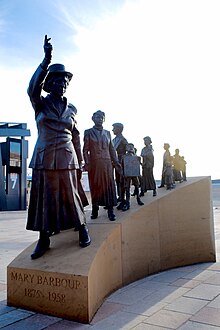
Mary Jeff | |
|---|---|
 | |
| Born | 1873 Glasgow, Scotland |
| Died | 1941 (aged 67–68) |
| Nationality | Scottish |
| Occupation | Politician |
| Known for | Local Politics |
Mary Jeff (1873-1941) was a Scottish activist and politician who was involved in the Glasgow rent strike.

Mary Jeff was born Mary Russell Watson in Coatbridge, Lanarkshire in 1873. She moved to Govan in 1896, and lived there with her husband, printer Andrew Jeff, and their three sons. [1] [2]
Mary and her husband were active in their community. They both had a key role in the Govan rent strike, Andrew as chair of the South Govan Tenants Committee, and Mary as part of the group of women who campaigned against eviction, and orchestrated the defence against bailiffs. Other women involved in this activity were Mary Barbour, Agnes Dollan, Mary Laird and Helen Crawfurd. [3] [1] She was a member of the Kinning Park Co-operative Women's Guild and the chairwoman of the Ladies section of the Govan War Memorial Committee. Two of her three sons had served in World War I, one of whom died. [1]
She was elected to Govan parish council in 1919, and served until at least 1926, on both the Children's Committee and the Relief Committee. [4] [5] [6]
In later years, she moved to Milngavie, where she was a member of Milngavie Bowling Club and an active member of the Deacon's court of St Luke's Church of Scotland. [7]
She died in 1941 in Milngavie, and was buried in Old Monkland Cemetery. [7]
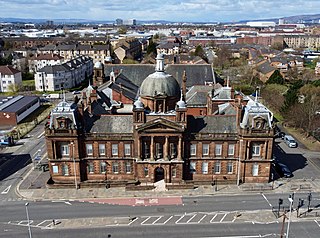
Govan is a district, parish, and former burgh now part of south-west City of Glasgow, Scotland. It is situated 2.5 miles (4.0 km) west of Glasgow city centre, on the south bank of the River Clyde, opposite the mouth of the River Kelvin and the district of Partick. Historically it was part of the County of Lanark.
Red Clydeside was the era of political radicalism in Glasgow, Scotland, and areas around the city, on the banks of the River Clyde, such as Clydebank, Greenock, Dumbarton and Paisley, from the 1910s until the early 1930s. Red Clydeside is a significant part of the history of the labour movement in Britain as a whole, and Scotland in particular.
Maria Fyfe was a Scottish politician and educator who served as Member of Parliament for Glasgow Maryhill from 1987 to 2001. She was Deputy Shadow Minister for Women from 1988 to 1991, Convener of the Scottish Group of Labour MPs from 1991 to 1992 and front bench spokesperson for Scotland from 1992 to 1995. Fyfe campaigned for 50-50 representation of women in the Scottish Parliament.
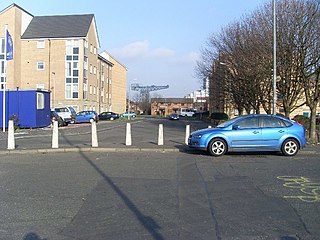
Kinning Park is a southern suburb of Glasgow, Scotland. It was formerly a separate police burgh between 1871 and 1905 before being absorbed by the city. In 1897, it had a population of 14,326.
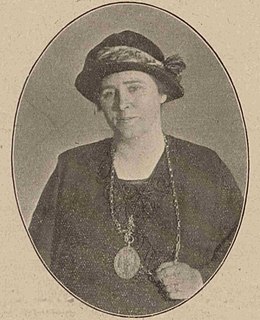
Mary Barbour was a Scottish political activist, local councillor, bailie and magistrate. Barbour was closely associated with the Red Clydeside movement in the early 20th century and especially for her role as the main organiser of the women of Govan who took part in the rent strikes of 1915.

Sir Patrick Joseph Dollan and his wife, Agnes, Lady Dollan were Glasgow activists in the Scottish Independent Labour Party. During the First World War they campaigned against the Munitions of War Act of 1915 which suspended trade unionists' rights for the duration of hostilities.

The Clyde Workers Committee was formed to campaign against the Munitions Act. It was originally called the Labour Withholding Committee. The leader of the CWC was Willie Gallacher, who was jailed under the Defence of the Realm Act 1914 together with John Muir for an article in the CWC journal The Worker criticising the First World War.

Glasgow Corporation Tramways were formerly one of the largest urban tramway systems in Europe. Over 1000 municipally-owned trams served the city of Glasgow, Scotland, with over 100 route miles by 1922. The system closed in 1962 and was the last city tramway in Great Britain.
Dr Mary Nicol Neill Armour LLD, née Steel, was a Scottish landscape and still life painter, art teacher and an Honorary President of the Glasgow School of Art and the Royal Glasgow Institute of the Fine Arts.

Isabella Ure Elder (1828–1905) was a Scottish philanthropist who took a particular interest in education, especially of women, and in the welfare of the people of Govan in Glasgow. In Govan alone, Elder was responsible for building Elder Park Library, a School for Domestic Economy, Cottage Hospital, the Cottage Nurses Training Home, and erecting a statue in honour of her husband John Elder. She also gave Elder Park to the people of Govan. Many of her philanthropic works are still open to the community today.

Helen Crawfurd Anderson was a Scottish suffragette, rent strike organiser, Communist activist and politician. Born in Glasgow, she was brought up there and in the London area.
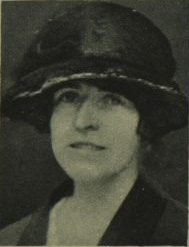
Agnes Johnston Dollan MBE, also known as Agnes, Lady Dollan, was a Scottish suffragette and political activist. She was a leading campaigner during the Glasgow Rent Strikes, and a founding organiser of the Women's Peace Crusade. In 1919, she was the first woman selected by the Labour party to stand for election to Glasgow Town Council, and later became Lady Provost of Glasgow.
Mary Burns Laird was a founding member and first President of the Glasgow Women's Housing Association, a President of the Partick Branch of the Women's Labour League, associated with the Red Clydeside movement, and supported the Glasgow Rent Strikes of 1915 alongside Mary Barbour, Agnes Dollan, Mary Jeff and Helen Crawfurd. Laird went on to participate in wider social activism for women and children's rights.

The Women's Peace Crusade was a grassroots socialist movement that spread across Great Britain between 1916 and 1918. Its central aim was to spread a 'people's peace', which was defined as a negotiated end to the First World War without any annexations or indemnities. The movement was first established in Glasgow in July 1916, and officially launched on 10 June 1917. It later spread across Great Britain, with demonstrations taking place in Leeds, Bradford, Leicester, Birmingham and Lancashire. Although it gathered a substantial following, the Women's Peace Crusade faced opposition from both the government and police, with members being arrested and reportedly threatened.
South Govan Women's Housing Association was established in 1915 under the leadership by Mary Barbour in Govan on the south side of Glasgow in Scotland.
Glasgow Women's Housing Association (GWHA) was established in Glasgow, Scotland, in mid-1914 by the Independent Labour Party Housing Committee launched by Andrew McBride in 1913 and the Women's Labour League in reaction to the increasing rent prices and overcrowding exacerbated by the advent of the First World War.
Red Skirts on Clydeside, produced in 1984, is the fifth documentary film made by the Sheffield Film Cooperative. It follows the process of rediscovering women's histories, focusing on the Glasgow Rent Strikes of 1915 and four of the women involved: Helen Crawfurd, Agnes Dollan, Mary Barbour, Jean Fergusson.

Frances Mary McPhun was a Scottish suffragette who served two months in Holloway prison, and had organised events and processions for women's suffrage in Edinburgh.
Kinning Park was a 19th-century sports ground in Kinning Park, Renfrewshire, Scotland, primarily used for cricket and football. It was the home of Clydesdale Cricket Club from 1849, staging a number of important matches against visiting English teams. It was also the original home of the club's football team, Clydesdale F.C. When both teams relocated to Titwood in 1876, Kinning Park was taken over by Rangers F.C., who played there until moving to the first Ibrox Park in 1887. The ground was the venue for the 1881 Scottish Cup Final between Queen's Park and Dumbarton.

Jenny Kerr Hyslop born Janet Kerr Reid was a Scottish community leader, co-operative worker and disability activist.